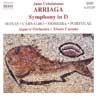Arriaga Symphony in D
That fine symphony by a gifted youngster plus ear-catching music from Iberia
View record and artist detailsRecord and Artist Details
Composer or Director: João de Sousa Carvalho, Marco Antônio (da Fonseca) Portugal, Juan Crisóstomo (Jacobo Antonio) Arriaga (y Balzola), (José António) Carlos de Seixas, António Leal Moreira
Genre:
Orchestral
Label: Naxos
Magazine Review Date: 12/2003
Media Format: CD or Download
Media Runtime: 58
Mastering:
Stereo
DDD
Catalogue Number: 8 557207

Tracks:
| Composition | Artist Credit |
|---|---|
| Symphony |
Juan Crisóstomo (Jacobo Antonio) Arriaga (y Balzola), Composer
Algarve Orchestra Álvaro Cassuto, Conductor Juan Crisóstomo (Jacobo Antonio) Arriaga (y Balzola), Composer |
| Sinfonia |
(José António) Carlos de Seixas, Composer
(José António) Carlos de Seixas, Composer Algarve Orchestra Álvaro Cassuto, Conductor |
| L'amore industrioso |
João de Sousa Carvalho, Composer
Algarve Orchestra Álvaro Cassuto, Conductor João de Sousa Carvalho, Composer |
| (Il) Duca di Foix |
Marco Antônio (da Fonseca) Portugal, Composer
Algarve Orchestra Álvaro Cassuto, Conductor Marco Antônio (da Fonseca) Portugal, Composer |
Author: Stanley Sadie
The performance by this Portuguese group admirably catches its passion, in the fiery first movement and the agitated, nervy finale, and also in the Schubertian warmth of the Andante. And the opera overture, an earlier work – he probably wrote it at 14 but may have revised it a little later – while obviously influenced by Rossini, has a tone of its own and many individual ingenious, felicitous touches. Its wit and spirit are happily captured here.
Nearly half this CD is occupied by Port-uguese music, all of it interesting, much of it attractive. The Seixas movements sound too like his harpsichord sonatas, with their way of nagging away at little motifs, just like Scarlatti, and their short-breathed invention. The overture by João de Sousa Carvalho, a leading figure in Portuguese musical life in the later 18th century, is a pleasant and inventive three-movement piece in the frothy Italian manner of around 1770.
António Leal Moreira’s single-movement sinfonia of 1803 begins with a rather imposing, self-important introduction, but with the Allegro jollity takes over, with a warbling clarinet tune, although there’s a quite pompous trumpety ending. There’s a similar pattern to the opera overture from 1805 by Marcos António da Fonseca Portugal, which already hints at what Rossini would soon be doing. These are attractive pieces, well worth a hearing for anyone curious about what was going on at the periphery of Europe in the high days of the Viennese classical era. Álvaro Cassuto directs alert performances from the Algarve orchestra that do the music ample justice.
Discover the world's largest classical music catalogue with Presto Music.

Gramophone Digital Club
- Digital Edition
- Digital Archive
- Reviews Database
- Full website access
From £8.75 / month
Subscribe
Gramophone Full Club
- Print Edition
- Digital Edition
- Digital Archive
- Reviews Database
- Full website access
From £11.00 / month
Subscribe
If you are a library, university or other organisation that would be interested in an institutional subscription to Gramophone please click here for further information.




